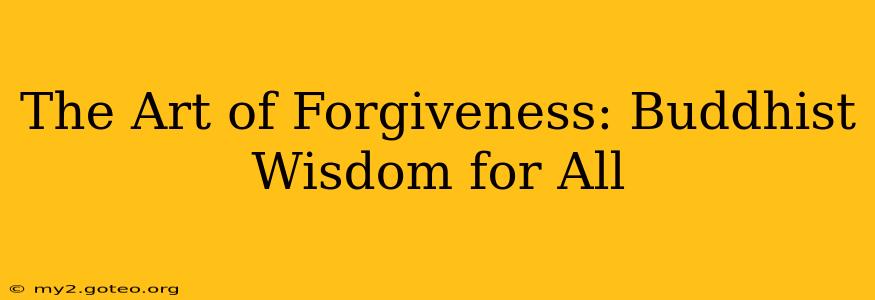Forgiveness. A word that evokes powerful emotions, from relief to resentment. It's a concept explored across cultures and religions, but Buddhism offers a particularly profound and practical approach to understanding and practicing forgiveness, not just for the sake of others, but for our own liberation. This isn't about condoning harmful actions, but about freeing ourselves from the chains of anger, bitterness, and resentment that poison our minds and hearts. This article delves into the Buddhist perspective on forgiveness, exploring its benefits and offering practical steps to cultivate this powerful skill.
What is Forgiveness in Buddhism?
In Buddhism, forgiveness isn't a passive act of letting go; it's an active process of releasing negative emotions and cultivating compassion. It's not about forgetting what happened, but about changing your relationship to the hurt. The goal is not to reconcile with the person who harmed you (though that may sometimes happen), but to free yourself from the suffering their actions caused you. This involves a deep understanding of impermanence (anicca) and the interconnectedness of all beings (pratītyasamutpāda). Recognizing that everyone is subject to suffering and makes mistakes paves the way for compassion and, ultimately, forgiveness.
Why is Forgiveness Important in Buddhism?
The importance of forgiveness in Buddhism is deeply rooted in the core tenets of the path to enlightenment. Holding onto anger and resentment hinders our spiritual progress. These negative emotions cloud our minds, preventing us from experiencing inner peace and clarity. By letting go of these emotions, we free ourselves from the cycle of suffering, allowing us to cultivate inner peace and wisdom. This, in turn, allows us to develop compassion, not just for those who have wronged us, but for all beings.
How Can I Practice Forgiveness?
Practicing forgiveness is a journey, not a destination. It requires patience, self-compassion, and consistent effort. Here are some practical steps based on Buddhist principles:
Understanding the Nature of Suffering:
- Acknowledge the pain: Don't suppress your feelings. Allow yourself to feel the hurt, anger, and resentment. Acknowledge the pain without judgment.
- Recognize the impermanence of suffering: Remember that all things are impermanent. This includes our emotions. Even the deepest pain will eventually pass.
Cultivating Compassion:
- Consider the other person's perspective: Try to understand why the person acted as they did. This doesn't justify their actions, but it can help you see them as a flawed being, just like yourself, subject to suffering and making mistakes.
- Practice loving-kindness meditation (Metta): This meditation involves cultivating feelings of loving-kindness towards yourself and others, including those who have harmed you.
Letting Go:
- Practice mindfulness: Observe your thoughts and emotions without judgment. When you notice anger or resentment arising, acknowledge them without getting carried away.
- Engage in acts of kindness: Helping others can be a powerful way to shift your focus from your own suffering to the well-being of others. This can be as simple as volunteering your time or offering a kind word.
What if I Can't Forgive?
It’s okay if you can't forgive immediately. Forgiveness is a process, and it takes time. Be patient with yourself. Don't judge yourself for struggling to forgive. It's crucial to practice self-compassion. Remember that the primary goal is your own liberation from suffering. Focus on your own healing and well-being, even if complete forgiveness remains elusive.
Does Forgiveness Mean Reconciliation?
No, forgiveness does not necessarily mean reconciliation. You can forgive someone without ever interacting with them again. Forgiveness is about releasing your own negative emotions, not about repairing the relationship. Reconciliation may or may not follow forgiveness. It's a separate decision, based on your safety and well-being.
How Does Forgiveness Relate to Karma?
In Buddhism, karma refers to the consequences of our actions. While forgiveness doesn’t erase the karmic consequences of someone's actions, it does free you from the negative karmic imprints of harboring resentment and anger. By forgiving, you break free from the cycle of negativity, fostering a more positive karmic path for yourself.
Conclusion: The Path to Inner Peace
The Buddhist path to forgiveness is a journey towards inner peace and liberation. By understanding the nature of suffering, cultivating compassion, and letting go of resentment, we free ourselves from the chains of negativity and open our hearts to a more peaceful and fulfilling life. It's a practice that requires patience and self-compassion, but the rewards – inner peace, clarity, and a deeper sense of connection with ourselves and others – are immeasurable.

